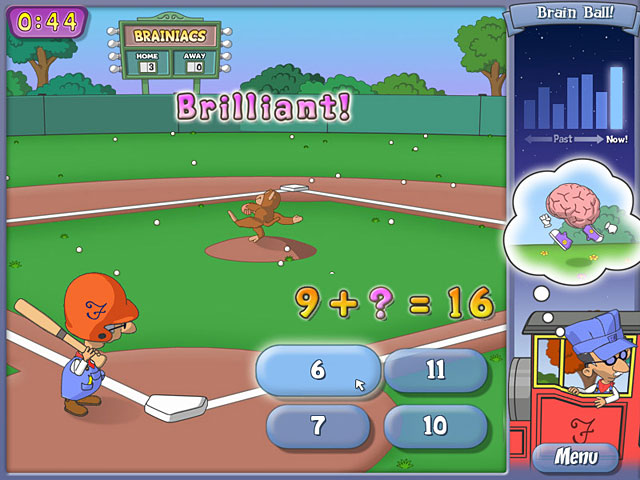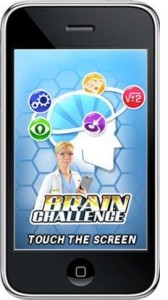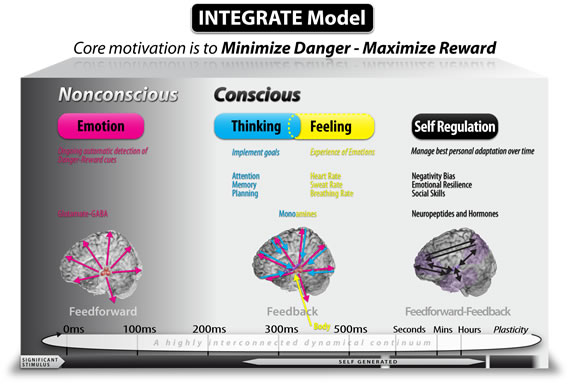How Visually Change Blind Are You?
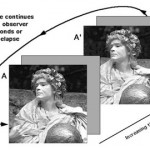 Found an interesting cognitive neuroscience demonstration on Go Cognitive designed to let you test yourself in the change-blindness paradigm. Change blindness involves making significant changes in a visual scene that go unnoticed.
Found an interesting cognitive neuroscience demonstration on Go Cognitive designed to let you test yourself in the change-blindness paradigm. Change blindness involves making significant changes in a visual scene that go unnoticed.
The demo is fun, gives you a number of scenes to work with and lets you control some key parameters. Experiment a bit, especially with the strategy you use to detect changes. Try defocussing your eyes and looking at the images globally to detect a difference and then try systematically comparing the images item by item. Which gives you a better score?
Categories: Perception, Software Tags:
A Sleeping Mind is a Terrible Thing to Waste
 In an earlier post I reported on research that demonstrated dreaming can improve your ability to solve a maze navigation task by a factor of 10. Since then I’ve been on the look out for science-based advice on how you can tune your approach to sleeping to solve problems, accelerate learning and improve creativity.
In an earlier post I reported on research that demonstrated dreaming can improve your ability to solve a maze navigation task by a factor of 10. Since then I’ve been on the look out for science-based advice on how you can tune your approach to sleeping to solve problems, accelerate learning and improve creativity.
The Scientific American just published a story, How Can You Control Your Dreams? that provides very specific advice. Here is a summary of how to problem solve in a dream:
- You must actually dream about it not just sleep on it
- Problems with a visual representation or solution and those that really require thinking outside the box (defy convention wisdom) yield best to dreaming.
- Prime yourself by thinking about the problem before you sleep. If possible hold an image of it in your head.
- If possible, include a diagram, instrument, sheet of music or whatever other artifacts are associated with your work with the problem near your bedside. Nothing mystical here is just deepens the priming effect.
- Wake up slowly, lying in bed and replay or savor your dream. You may only have fragments but focus on emotions you feel and the rest should follow. This is critical. The solution or partial solution may become evident just as you are waking.
If this method is going to work for you it should do so quickly. Try it for a couple of weeks.
The article goes on to discuss techniques for how to dream about specific people, escape nightmares and engage in lucid dreaming or being aware you are dreaming while you are dreaming.
Very interested to hear from readers that use the dreaming mind to improve brain function and enhance cognitive performance.
Categories: Memory and Learning, Sleep, Training Tags:
Music Training Pumps Up Your Brain
 New research from Northwestern University, Taking Music Seriously, confirms that learning to play a musical instrument is a powerful way to improve general brain function and cognitive performance. To quote:
New research from Northwestern University, Taking Music Seriously, confirms that learning to play a musical instrument is a powerful way to improve general brain function and cognitive performance. To quote:
“Now a data-driven review by Northwestern University researchers that will be published July 20 in Nature Reviews Neuroscience pulls together converging research from the scientific literature linking musical training to learning that spills over to skills including language, speech, memory, attention and even vocal emotion. The science covered comes from labs all over the world, from scientists of varying scientific philosophies, using a wide range of research methods.”
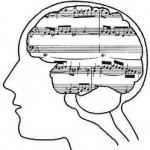 It seems musical training enhances neuroplasticity and primes the brain for improved performance in a variety of communication and learning tasks. These appear to be life-long and life-wide (outside the context of music) effects.
It seems musical training enhances neuroplasticity and primes the brain for improved performance in a variety of communication and learning tasks. These appear to be life-long and life-wide (outside the context of music) effects.
Interested to hear from readers that use musical training for brain fitness and and cognitive enhancement.
Categories: Memory and Learning, Mental Focus, Music and Audio, Training Tags:
14 Research Proven Ways to Improve Creativity
 The PsyBlog recently published a couple of posts outlining 14 techniques with supporting psychological research for being more creative. The posts are:
The PsyBlog recently published a couple of posts outlining 14 techniques with supporting psychological research for being more creative. The posts are:
I won’t repeat the techniques here as they are described and referenced well in the posts. They are worth a read and some experimentation.
I guarantee you will find at least 2 or 3 techniques you have not tried before.
Interested to hear from readers on specific techniques for boosting creativity.
Categories: Problem Solving, Training Tags: creativity
Focused Training Produces Extreme Mental Feats Even in Older Adults
The Next Brain Blog is dedicated to exploring the techniques, materials and lifestyle choices that lead to improved brain function and peak cognitive performance. Much of what you will find on this blog produces incremental effects. The idea is to combine many of them into a program and reap the rewards over the longer term. That is the way it works with physical exercise and indeed with most things in life. But this need not be as boring as it sounds.
A longterm tightly-focused cognitive training program can produce extreme and even profound results in ordinary people.
Take for example, the case recently reported in the Research Blog about a 58 year old man, JB, that was able to memorize and recite (under controlled conditions) the entirety of Milton’s Paradise Lost. That is a 10,565 line 60,000 word epic poem. It took him nine years.
“Just how did JB manage to pull off this incredible feat? He studied for about one hour per day, reciting verses in seven-line chunks, consistent with Miller’s magic number seven – the capacity of short-term, working memory. Added together, JB estimates that he devoted between 3000 to 4000 hours to learning the poem. Seamon’s team interpret this commitment in terms of Ericsson’s ‘deliberate practice theory’, in which thousands of hours of perfectionist, self-critical practice are required to achieve true expertise.”
And his performance was far find mindless memorization. It involved “deep cognitive involvement” with the material.
One hour a day for nine years. A lot of training but doable. You may not be interested in memorizing a book but that’s not the point. JB’s work demonstrates that we can achieve extreme mental performance if we are willing to put in the work. A general claim is that with the right training you can achieve world-class performance in 10 years or 10,000 hours in any domain. It is not talent that wins but dedication, proper training and time. Looks like this might hold for cognitive performances as well.
Very interested to hear from readers that are considering or engaged in a longterm tightly-focused cognitive training program.
Categories: Memory and Learning, Older Adult, Training Tags:
The Amazing Brain Train
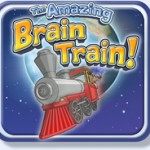 A playful way to do a little brain training using games: “Fueled by your mental energy, Professor Fizzwizzle’s Brain Train will take you on a brain-boosting adventure!
A playful way to do a little brain training using games: “Fueled by your mental energy, Professor Fizzwizzle’s Brain Train will take you on a brain-boosting adventure!
Put your mighty mind to the test and see how far you can go!”
15 online games for training your brain in planning, memory, spatial reasoning and numbers all for $6.99 or free for 24-hours. For a quick look check out this video.
Categories: Child, Memory and Learning, Mental Focus, Perception, Software Tags: games
Brain Challenge HD on Sale for Only $0.99
iPhone and iPad users can get Brain Challenge HD at a discount. If you like this brain teasing approach be sure to check out Brain Challenge 2, 3 and 4 by Gameloft.
Categories: Cognitive Decline, Memory and Learning, Other, Software Tags: games
Phosphatidylserine Improves Thinking in 10 Days
 Phosphatidylserine is a supplement that some claim can stave off cognitive decline in the elderly and boost memory, learning, mood and decision-making in people of all ages. I have seen conflicting studies so I am always on the look out for new ones that are done with great scientific rigor and that might help settle the issue.
Phosphatidylserine is a supplement that some claim can stave off cognitive decline in the elderly and boost memory, learning, mood and decision-making in people of all ages. I have seen conflicting studies so I am always on the look out for new ones that are done with great scientific rigor and that might help settle the issue.
Found one recently that was presented at the 7th Annual International Society of Sports Nutrition Conference. It was a small study but it was double blinded and placebo controlled. You can read about it in, Study Shows PS Use Improves Cognition Prior To Exercise.
Here is the key finding:
“Cognitive performance was measured by the serial subtraction test (SST), a validated method in which subjects repeatedly subtract from 1,579 by intervals of seven. PS supplementation did reduce the time needed for a correct calculation by 21%, reduced the total amount of errors by 38% and increased the amount of correct calculations per error by 42% prior to exercise.”
To achieve this effect athletes took 400 mg a day for 10 days. I don’t think “safe and effective” dose guidelines have been established I have seen other studies and recommendations that use between 300-500mg daily.
I am not advocating the use of this supplement. I am however, interested in hearing from readers that use it. What dose, how long and what kind of benefits or side effects are you experiencing?
Categories: Cognitive Decline, Decision Making, Diet, Manage Emotions, Memory and Learning Tags: smart drugs
Integrated Brain Training Over the Web
MyBrainSolutions offers a software-based brain training program over the web. There are also some apps for your smart phone. You can sign up for the basic membership for free or pay $9.95/month for the premium service. With the premium service you complete a brain assessment and get training recommendations based on your specific needs. You also get access to more training exercises. The basic membership gives you four. With both memberships you get a personal dashboard (web page) that provides access to your tools and results.
The program appears unique in its emphasis on emotions, thinking, feelings and self-regulation and how they work together in an integrated way. You can watch a five minute video on the site that explains it. The emphasis on automatic processing of emotional queues (mainly facial expressions) and how that shapes our intuitions and decision-making, is right on. I have not seen any other brain training program tackle that.
I am using the basic membership and like what I see. Interested to hear from readers that have purchased the premium membership. Is it worth $10 per month? Thanks.
Categories: Executive Function, Manage Emotions, Memory and Learning, Software Tags: brain training, EQ, smart phone
Not All Naps Have Brain Boosting Effects
 Taking naps has been a hot topic for improving learning, memory and mental alertness for sometime. We have covered it several times in the Next Brain Blog. However, it does not always work. Turns out there is a knack to getting the brain boosting effects from napping. Psychology Today has an excellent article, Ultimate Napping: A How-To Guide, that provides specific guidelines. Some examples:
Taking naps has been a hot topic for improving learning, memory and mental alertness for sometime. We have covered it several times in the Next Brain Blog. However, it does not always work. Turns out there is a knack to getting the brain boosting effects from napping. Psychology Today has an excellent article, Ultimate Napping: A How-To Guide, that provides specific guidelines. Some examples:
- For younger nappers 10-20 minutes is ideal. Sleeping longer will leave you groggy not mentally alert.
- Pick your time, place and be sure to have sleeping gear – pillow, blanket and teddy bear.
- Drinking a caffeinated beverage right before you nap is a great way to wake up fully alert .
- Don’t stress if you don’t fully fall asleep. Just resting can rejuvenate.
Most of the suggestion fit my personal experience well. I have used napping for years. This illustrates that the techniques we use to improve brain function and cognitive performance are often very simple, but applying them effectively can be a bit tricky.
Very interested to hear from readers about specific napping tricks-of-trade that improve cognitive performance.
Categories: Lifestyle, Memory and Learning, Mental Focus Tags:


